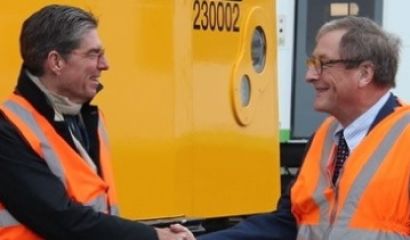ROLLING stock company Vivarail has signed a deal with battery manufacturer Hoppecke for its Class 230 trains.
Vivarail is supplying the converted London Underground cars to several operators, including Transport for Wales.
The company launched a battery-only train in Scotland in October, which included test runs on gradients. A mobile charging unit topped up the batteries overnight.
A 3-car Class 230 running only on batteries can cover around 100km between charges, and Vivarail said ‘active conversations are taking place with interested operators’.
The latest development has moved the research on from various hybrid concepts, such as diesel/battery, to battery-only operation.
Hoppecke manufactures Lithium Ion batteries which Vivarail said are ‘ideally suited’ for its Class 230s, because such batteries can be charged rapidly.
Vivarail CEO Adrian Shooter said: ’We are delighted to be working with Hoppecke – a company with similar values to our own. Hoppecke has built a strong reputation for innovation, building customer relations and genuinely smart products. We have taken our time choosing a supplier with whom we want to work for many years as our order pipeline continues to grow. Together with Hoppecke we will be able to provide our customers with battery trains that are reliable, quick to market and with a rapidly increasing range. I look forward to the first of our Class 230 trains complete with Hoppecke batteries coming into service soon.’
Hoppecke CEO Dr Marc Zoellner said his company had been following Vivarail’s progress with ‘great interest’, and that Hoppecke was delighted to be associated with the continuing development of battery-powered trains.
The Class 230s are a rebuild of former London Transport D78 stock, which came into service on the District Line in 1980. The project has now been running experimentally for several years using rolling stock from the District Line, but the use of batteries rather than automotive engines is a recent development.
Vivarail is already building a fleet of diesel/battery hybrids to operate the Wrexham-Bidston line for Transport for Wales, where the diesel generators on board will be used to charge the batteries rather than provide the motive power directly.
West Midlands Trains has also signed a contract to use the trains on its route between Bedford and Bletchley, although a technical matter has delayed their introduction, originally planned for this month. At the end of October, Adrian Shooter of Vivarail said he was ‘confident that my team will deliver the finished trains with a minimal delay’.


